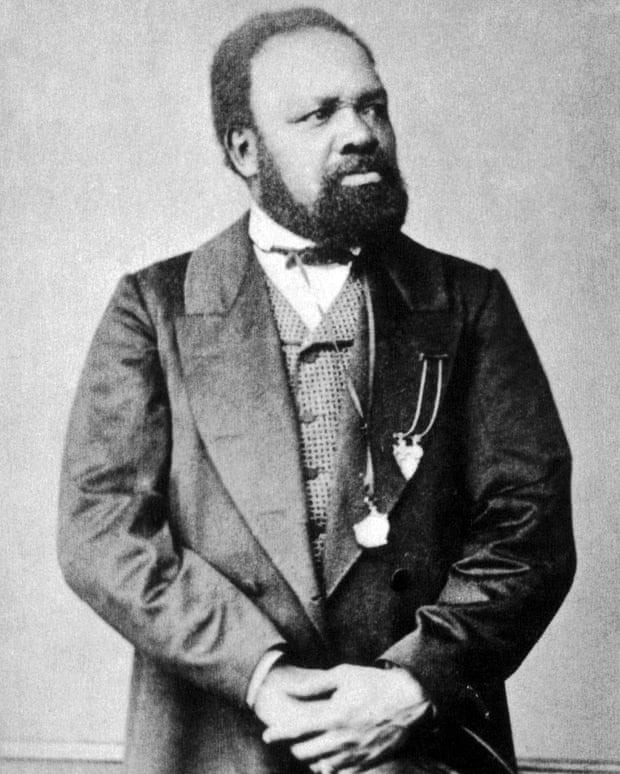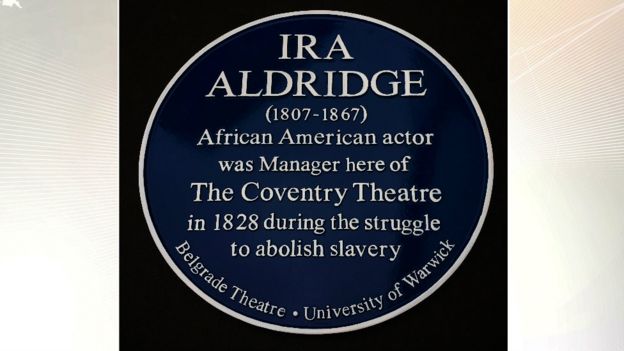Ira Aldridge was the first non-white actor to portray Othello in England. Now his legacy will play a key role in the city’s bid to be the capital of culture
When Ira Aldridge stepped on stage as the first black actor to play Othello, the Moor of Venice, he had an insight into the role shared by no other performer of the day. Arriving in England from America in the early 1820s, he had been met with prejudice and suspicion, like Shakespeare’s hero, especially when he went on to marry an Englishwoman. But the towering theatrical reputation that Aldridge built up across Europe during the mid-1800s rested just as much on his portrayal of a full range of leading roles as on his unusual racial status.
Now the people of Coventry are finally to claim the actor as a key part of their cultural heritage and plan to celebrate his achievements with a series of readings, performances and guided walks. The city was already proud of its connection with Aldridge, recognised now as Britain’s first black theatre manager because of his 1828 stint running the former Coventry Theatre. But the full impact of Aldridge’s career has come to light. New research reveals the extent of his role in the political campaign against slavery in the colonies.
“Aldridge chose to play a lot of anti-slavery roles, including Othello, as well as the standard lead parts in the repertoire,” said Tony Howard, professor of English at Warwick University. “And at the height of his influence in Coventry, there was actually a public petition held at County Hall for all those against slavery to sign.”
The activities are designed as part of Coventry’s bid for the title of City of Culture in 2021 and include the staging of a new docu-drama about the life of Aldridge at the Belgrade Theatre, as well as a guided walk to the site of the former Coventry Theatre, later called the Theatre Royal and Empire. Extracts from several plays Aldridge programmed in his 1828 Coventry season, including Othello, The Taming of the Shrew, the anti-slavery melodrama The Revenge and a musical called The Slave, will also be staged as part of Against Prejudice – Ira Aldridge in Coventry 1828.
Aldridge’s story clearly provides a welcome alternative to other well-rehearsed stories about the city, from Lady Godiva’s mythical horse ride through its streets to the destruction wrought by the Blitz more than 70 years ago.
Aldridge, who was also known as FW Keene, appears to have felt equally positive about the city that had given him a chance to run his own theatre. David Burbidge, chair of the Coventry City of Culture trust, cites a letter of thanks the actor wrote to the local newspaper almost 180 years ago. It first details his plans to “improve the fittings” at the theatre and make sure that curtain up always commenced “precisely at seven”. Then it continues: “FWK [FW Keene] might have feared that, unknown and unfriended, he had little claim to public notice, did he not feel that being a foreigner and a stranger are universal passports to British Sympathy. He desires only to be judged by his actions and relies on that discrimination and generosity which appreciates endeavour and rewards effort.”
Burbidge believes this makes Aldridge the perfect embodiment of culture in a diverse city. “In other words, he felt he might not be welcome but rather than being held back, the city judged him not on his colour or creed but on what he wanted to achieve and his clear talent … In adopting Ira Aldridge’s story we hope to inspire young people in particular to learn from this ambition and talent of nearly 200 years ago,” he writes.
Many black performers, inspired by Aldridge’s legacy, have gone on to become well-known names, from Paul Robeson to Adrian Lester, but the story of the man himself has been slow to re-emerge.
“Aldridge has always interested black stars, but the wider influence he had is not well known,” said Howard. “Robeson was a great fan of his, and when he came to London to play Othello in 1930 at the Savoy, he put on an exhibition about Aldridge in respect of his memory.”
In 2012, Lester starred at the Tricyle Theatre in north London in Red Velvet, a new play about Aldridge, written by Lester’s wife, Lolita Chakrabarti. The acclaimed production was revived early this year at the West End’s Garrick, with Lester earning renewed plaudits for his rendering of soliloquies in the authentic 19th-century declamatory manner.
The phrase “political theatre” is more usually associated with the modern era, and yet Howard believes there is no clearer example of it than in the close relationship between Aldridge’s work and shifting social attitudes.
“He really was able to make the most of good timing. He came into Coventry at the age of 20 and wanted to meet the important people of the town. He then went through the most extraordinary change of circumstance in the course of just two months. By the end of it, he was running a theatre,” said Howard.
The Coventry Theatre had been built by the theatre manager Sir Skears Rew but, by the time Aldridge arrived in the city, Rew was very ill and the venue had fallen into disrepair. The actor must have impressed Rew, an alderman, fervent anti-Tory campaigner and abolitionist. Before he died on 23 April he had handed over the theatre to Aldridge in what Howard believes was both a political move and a leap of faith.
“It seems such an extremely young age to have the responsibility,” Howard said. “It is the one time the community took a bet on Aldridge and he made a success of it in only a few short months. Both the shows and the standards of rehearsals were much improved.”
Aldridge was born in New York and, as a teenager, had been involved in an attempt to create a black theatre company. These plans were effectively destroyed by a rival New York manager who, according to Howard’s research, “hired thugs to beat up the actors”. The theatre subsequently burned down and the actors were victimised by the New York police. Aldridge managed to board a ship to England but initially encountered the same sort of racist treatment. He was regarded as something of “a circus freak,” said Howard. He toured Britain in serious productions but was first billed to West Midlands audiences as a “Most Extraordinary Novelty, a Man of Colour”.
“But audiences were then utterly astonished by the skill of his acting. Critics said he was one of the two or three best they had ever seen,” said Howard.
Aldridge’s first wife was the daughter of a member of parliament, something anti-abolitionists regarded as a real provocation. “From one political perspective he was your worst nightmare come true, for others he was a symbol of all that might be possible,” said Howard.
Aldridge toured Europe and was hailed by fans as the “African Roscius”, after the actor popular in ancient Rome, Quintus Roscius Gallus. Aldridge was fêted in Russia, too. But once work in England had dried up, he was forced to consider returning to America.
He died in 1867 in Poland, after both the end of slavery and the American civil war. He had been about to go back to America, where several prominent white actors had declared that they were ready and willing to act with him in New York. Next summer, 150 years after his death, the City of Culture trust in Coventry hopes to put up a plaque to his memory on the site of his lost theatre.
CULTURAL CAMPAIGN■ Coventry’s celebration of its links with Ira Aldridge are part of its bid for City of Culture status in 2021. Coventry, now home to 250 Syrian immigrants, hopes to underline its diversity.
■ The bid trust is also showcasing the work of Indian photographer Maganbhai Patel, 94. His exhibition at Fargo Village, to 20 November, chronicles south Asian immigrants since the 1950s.
■ Coventry also hopes to establish itself as the home of peace studies and research, with an annual Peace Festival, set up in response to the destruction after second world war bombing. The Lord Mayor’s Annual Peace Lecture was given by War Horse author Michael Morpurgo, and a Remembrance Sunday service and parade are to be staged at the city’s War Memorial Park.
NB: The Empire Theatre mentioned in the article was in Smithford Street, not the one in Hertford Street.



